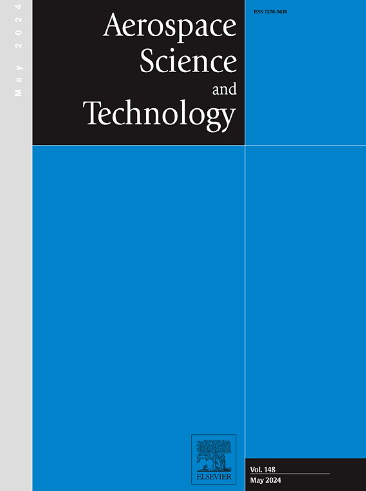Prescribed-time fault-tolerant tracking control for quadrotor UAV with guaranteed performance
IF 5
1区 工程技术
Q1 ENGINEERING, AEROSPACE
引用次数: 0
Abstract
During the actual flight of unmanned aerial vehicle (UAV), there are widespread actuator faults, system uncertainties and external disturbances, which bring significant threats to its steady flight. This paper studies the problem of prescribed-time fault-tolerant tracking control for quadrotor UAV with guaranteed performance. By integrating error reconstruction and dynamic adjustment strategies, this paper ensures that the position and attitude tracking errors converge to the preset performance range within the prescribed time. Furthermore, this paper utilizes the disturbance observer failure compensation method to simultaneously handle the multiplicative and additive failures of the actuator simultaneously, and presents a nonlinear observer-based adaptive strategy to estimate additive faults and unknown external disturbances acting on the UAV. Simulation results show that the position and attitude tracking errors converge to the preset accuracy within the prescribed time without actuator failures. When actuator failures occur, the attitude tracking error still converges on time, and the convergence rate of position error is minimally affected. Thus, the proposed control algorithm for quadrotor UAV is validated.
保证性能的四旋翼无人机定时容错跟踪控制
在无人机的实际飞行过程中,普遍存在执行器故障、系统不确定性和外界干扰等问题,对无人机的稳定飞行构成重大威胁。研究了保证性能的四旋翼无人机定时容错跟踪控制问题。通过误差重构和动态调整相结合的方法,保证了位置和姿态跟踪误差在规定时间内收敛到预定的性能范围。利用扰动观测器故障补偿方法同时处理执行器的乘性故障和加性故障,提出了一种基于非线性观测器的自适应策略来估计作用在无人机上的加性故障和未知外部干扰。仿真结果表明,在不发生致动器故障的情况下,位置和姿态跟踪误差在规定时间内收敛到预定精度。当执行器发生故障时,姿态跟踪误差仍能按时收敛,对位置误差收敛速度的影响最小。从而验证了四旋翼无人机控制算法的有效性。
本文章由计算机程序翻译,如有差异,请以英文原文为准。
求助全文
约1分钟内获得全文
求助全文
来源期刊

Aerospace Science and Technology
工程技术-工程:宇航
CiteScore
10.30
自引率
28.60%
发文量
654
审稿时长
54 days
期刊介绍:
Aerospace Science and Technology publishes articles of outstanding scientific quality. Each article is reviewed by two referees. The journal welcomes papers from a wide range of countries. This journal publishes original papers, review articles and short communications related to all fields of aerospace research, fundamental and applied, potential applications of which are clearly related to:
• The design and the manufacture of aircraft, helicopters, missiles, launchers and satellites
• The control of their environment
• The study of various systems they are involved in, as supports or as targets.
Authors are invited to submit papers on new advances in the following topics to aerospace applications:
• Fluid dynamics
• Energetics and propulsion
• Materials and structures
• Flight mechanics
• Navigation, guidance and control
• Acoustics
• Optics
• Electromagnetism and radar
• Signal and image processing
• Information processing
• Data fusion
• Decision aid
• Human behaviour
• Robotics and intelligent systems
• Complex system engineering.
Etc.
 求助内容:
求助内容: 应助结果提醒方式:
应助结果提醒方式:


